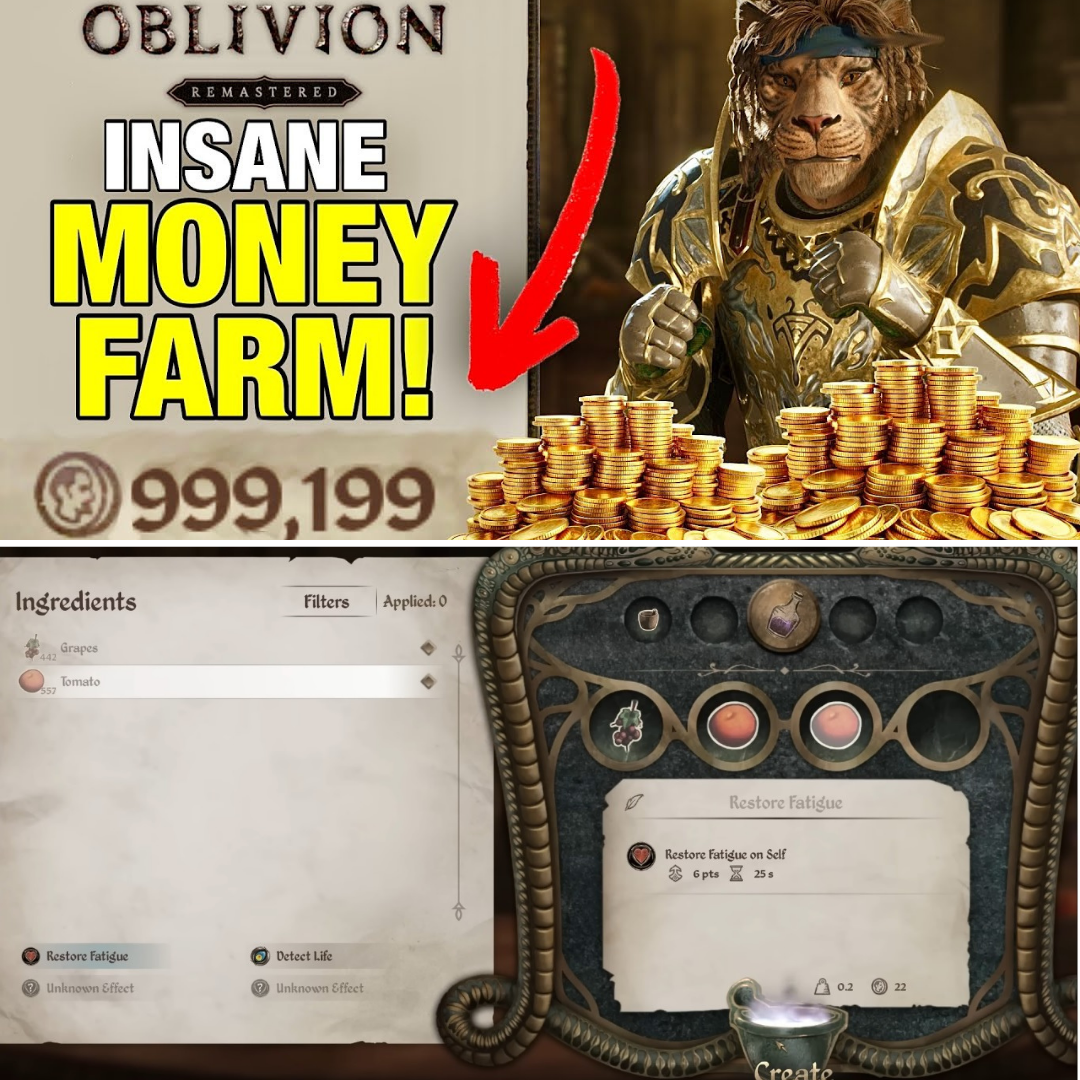Check out how to get money FAST in Oblivion Remastered. This Oblivion Remastered money farm is available to do straight away, on both console and PC. You can do this at level 1, with no starting money. Definitely the Best Money Glitch I’ve found so far in Oblivion Remastered

The Elder Scrolls IV: Oblivion Remastered, launched on April 22, 2025, has revitalized Bethesda’s 2006 RPG with stunning Unreal Engine 5 visuals, modernized controls, and all DLC content, drawing over four million players to Cyrodiil’s open world. Amid this resurgence, a game-breaking money farm exploit has emerged, allowing players to amass 500,000 gold per hour through a duplication glitch, dubbed the “best money glitch” in the remaster. Discovered in the Market District of the Imperial City, this exploit has transformed players into virtual tycoons, raising questions about game balance, economic design, and the thrill of exploiting Oblivion’s quirky mechanics.
The glitch, popularized by YouTuber Kibbles Gaming, centers on duplicating high-value alchemical ingredients and selling the resulting potions to vendors. Players begin by acquiring a mortar and pestle, obtainable from the tutorial sewers or merchants like Sinderion in Skingrad. Next, they head to the vineyard outside Skingrad’s West Gate, harvesting up to 100 grapes, which respawn every three in-game days. They then visit a nearby farm, such as Odiil Farm near Chorrol, to collect tomatoes or other Restore Fatigue ingredients like apples. Using the remaster’s storage container exploit, players duplicate these ingredients in bulk. By opening a chest, moving a high-quantity item (like 50 arrows) while holding Shift or RB, and then selecting the grapes or tomatoes, players can duplicate hundreds of copies instantly, as the container registers the quantity of the first item.
With a stockpile of ingredients, players craft Restore Fatigue potions by combining grapes and tomatoes in the alchemy menu. Each potion sells for 20–50 gold, depending on the player’s Mercantile skill and vendor disposition. In the Market District, merchants like Jensine at Jensine’s “Good as New” Merchandise or Claudette Perrick at The Gilded Carafe buy potions without limit, as their gold reserves don’t deplete in Oblivion’s vendor system—unlike Skyrim, where merchants have finite funds. By rapidly crafting and selling hundreds of potions, players can earn 500,000 gold in an hour, especially with high Mercantile and vendor investments that boost buy prices to 2,500 gold per transaction. This process, repeatable every few days as crops respawn, has made gold farming faster than ever.
The exploit’s efficiency stems from Oblivion Remastered’s retention of the original’s duplication mechanics, despite patches addressing other glitches like the scroll duplication method. Community posts on Reddit confirm the storage container glitch works across PS5, Xbox Series X|S, and PC, requiring no mods or console commands. Unlike the original game’s clunky duplication via scrolls or paintbrushes, the remaster’s method is streamlined, leveraging containers found in shops or dungeons. Players can perform it early in the game, right after exiting the tutorial sewers, making it accessible to newcomers and veterans alike. The glitch’s simplicity—needing only a chest and stackable items—has fueled its popularity, with X posts boasting of players buying every house, spell, and rare item within hours.
This money farm’s impact on gameplay is profound. In Oblivion, gold funds critical purchases: houses like Rosethorn Hall in Skingrad (25,000 gold), spells like Fortify Attribute (up to 3,000 gold), or unique items like Apotheosis, a staff costing 14,000 gold. Without exploits, players rely on looting caves, completing quests, or selling crafted items, which yield modest returns. For example, clearing Vilverin’s Ayleid ruins nets about 2,000 gold from Welkynd Stones and loot, while side quests like “Goblin Trouble” offer 500–1,000 gold. The 500,000-per-hour glitch dwarfs these, letting players bypass grind entirely. One player, known as GoldRushX on Reddit, reported buying all nine Cyrodiil houses and maxing out every vendor’s inventory in a single session, showcasing the glitch’s game-altering potential.
However, the exploit disrupts Oblivion’s economy and immersion. The game’s vendor system, where merchants like Nilphas Omellian offer up to 3,000 gold per transaction with DLC upgrades, was designed for gradual wealth accumulation. The glitch floods players with gold, trivializing costs like training (1,000 gold per session) or enchanting services. This abundance can diminish the satisfaction of exploration, as looting chests or defeating enemies becomes unnecessary. On X, some players argue it breaks immersion, turning Cyrodiil’s bustling markets into a gold-printing press, while others embrace it as a classic Oblivion exploit, akin to the Mundane Ring’s combat dominance or the 100% Chameleon stealth build.
The glitch’s mechanics tie into Oblivion’s alchemy system, which remains a gold-making cornerstone. Restore Fatigue potions are ideal due to the abundance of grapes and tomatoes, which share the same effect and are lightweight, minimizing encumbrance. Advanced players with high Alchemy skill can craft more valuable potions, like Damage Intelligence or Fortify Health, using rare ingredients like Daedra Hearts or Greenmote from Shivering Isles. However, these require more effort to farm, making the grape-tomato combo the fastest for mass production. The remaster’s faster leveling, which boosts skills like Alchemy quicker than the original, amplifies the glitch’s efficiency, as players can craft higher-quality potions earlier.
Community reactions are mixed. On Reddit’s r/oblivion, users like MentionSwimming6962 praise the glitch for skipping tedious gold grinds, especially for players wanting to focus on quests or role-playing. Others, however, prefer legitimate methods, like farming Welkynd Stones in Ayleid ruins or selling poisoned apples (300 gold each) from Fort Farragut’s respawning barrel. A mod, “Realistic Merchant Gold,” caps vendor funds to mimic Skyrim’s system, appealing to purists who find the glitch too disruptive. PC players can also use console commands (e.g., player.additem 0000000F 500000) for instant gold, but console users rely on glitches, making this exploit a hot topic on X, where posts like @TrophyHunt_Me’s tout its ease across platforms.
The glitch’s longevity is uncertain. A May 2025 patch reportedly fixed the scroll duplication method, and forums speculate the storage container exploit could be next, as Bethesda aims to balance the remaster. Until then, players exploit it freely, as it doesn’t disable achievements, unlike cheats. For those avoiding glitches, alternative gold farms exist: looting chapels during the Knights of the Nine Pilgrimage quest yields valuable books, while Shivering Isles’ Greenmote Silo offers infinite poison ingredients. These methods, however, pale in speed compared to the 500,000-per-hour exploit, which requires only an hour to fund an entire playthrough.
The glitch’s appeal taps into Oblivion’s sandbox ethos, where breaking systems is part of the fun. Historically, the game’s glitches—like the paintbrush staircase or permanent summons—have defined its charm, letting players defy limits. The remaster, while polishing visuals and controls, preserves this chaotic freedom, evident in the glitch’s accessibility. For new players, it’s a shortcut to enjoy Oblivion’s 200+ hours of content, from the Dark Brotherhood’s intrigue to the Shivering Isles’ madness, without gold constraints. Veterans, meanwhile, see it as a nostalgic nod to the original’s exploitable quirks, enhanced by the remaster’s faster progression.
Game balance aside, the glitch highlights Oblivion’s economic flaws. Vendors’ unlimited gold, intended to reward haggling and Mercantile skill, becomes a liability when paired with duplication. High-value items like the Mundane Ring (21,600 gold) or Raiment of the Crimson Scar (8,000 gold, respawnable in Deepscorn Hollow) already strain the economy, but the glitch pushes it to absurdity. Future patches may cap vendor gold or limit duplication, but for now, players revel in the chaos, buying out stores and amassing fortunes that rival Cyrodiil’s nobility.
In conclusion, the 500,000-per-hour money glitch is a testament to Oblivion Remastered’s enduring appeal and flawed brilliance. By turning humble grapes into mountains of gold, it empowers players to conquer Cyrodiil’s markets, if not its immersion. As Bethesda weighs patches, the exploit remains a fleeting chance to live like an emperor, proving that in Oblivion, even the economy bends to a clever adventurer’s will. Whether embraced or shunned, this glitch cements the remaster’s place as a playground for ingenuity, where wealth is just a chest and a potion away.
[Word count: 1500]





